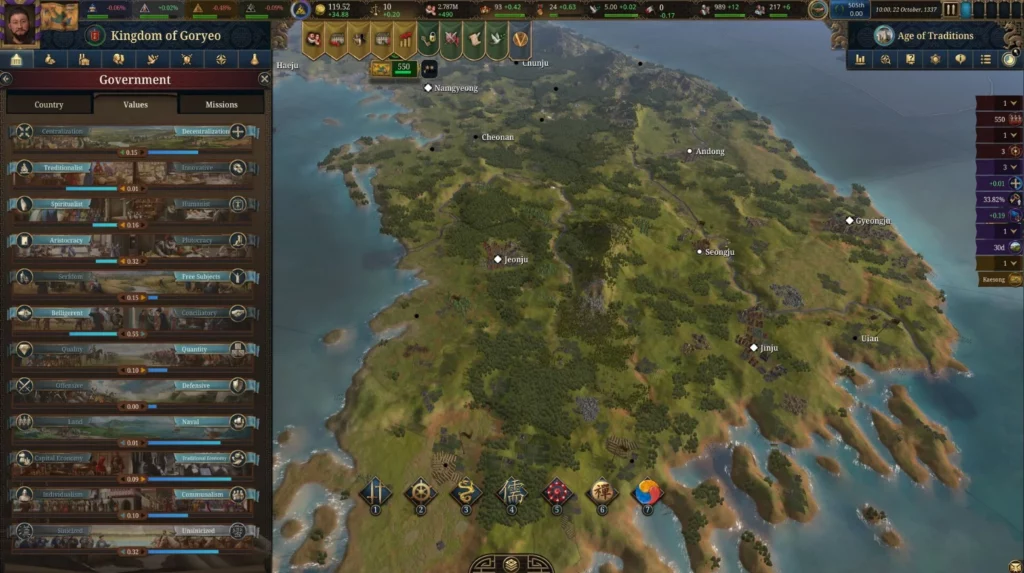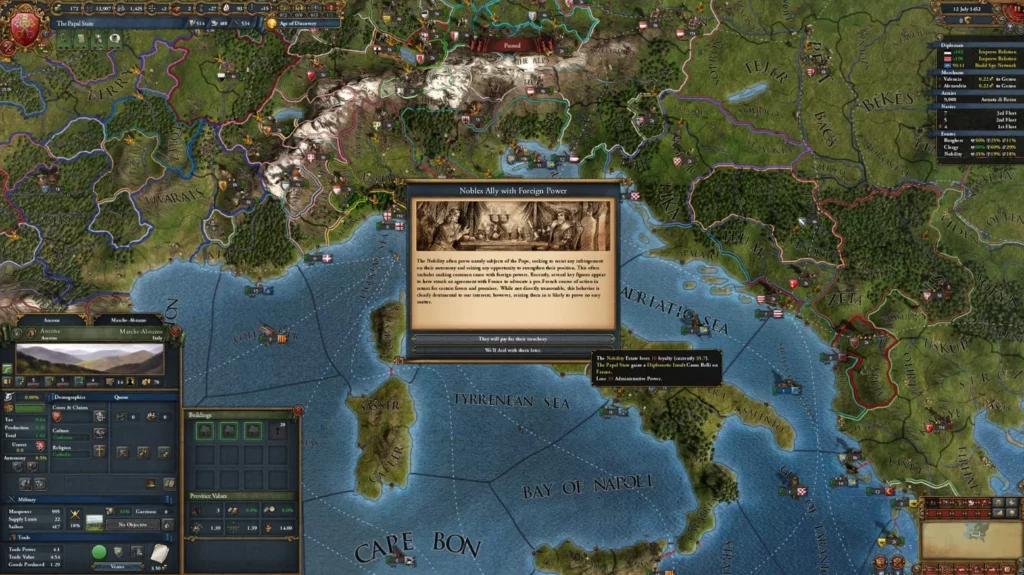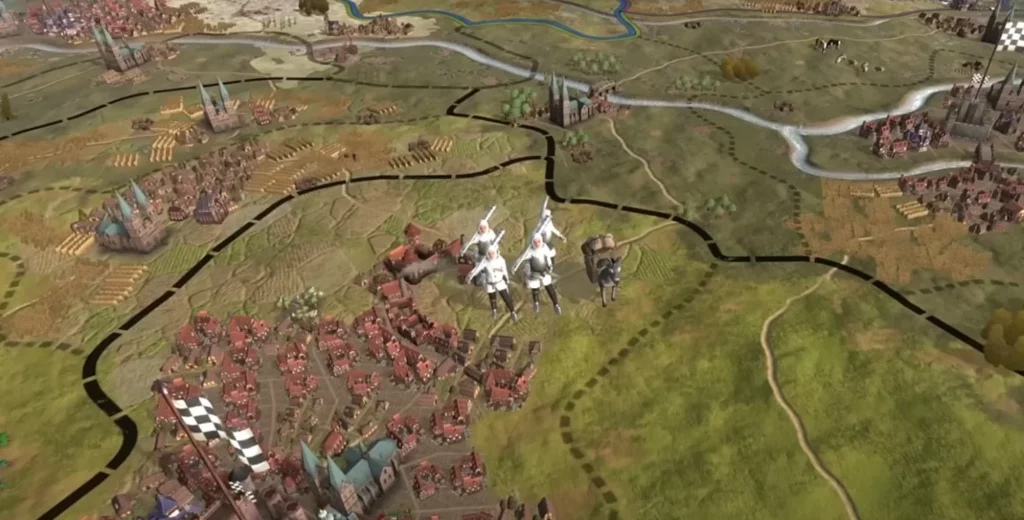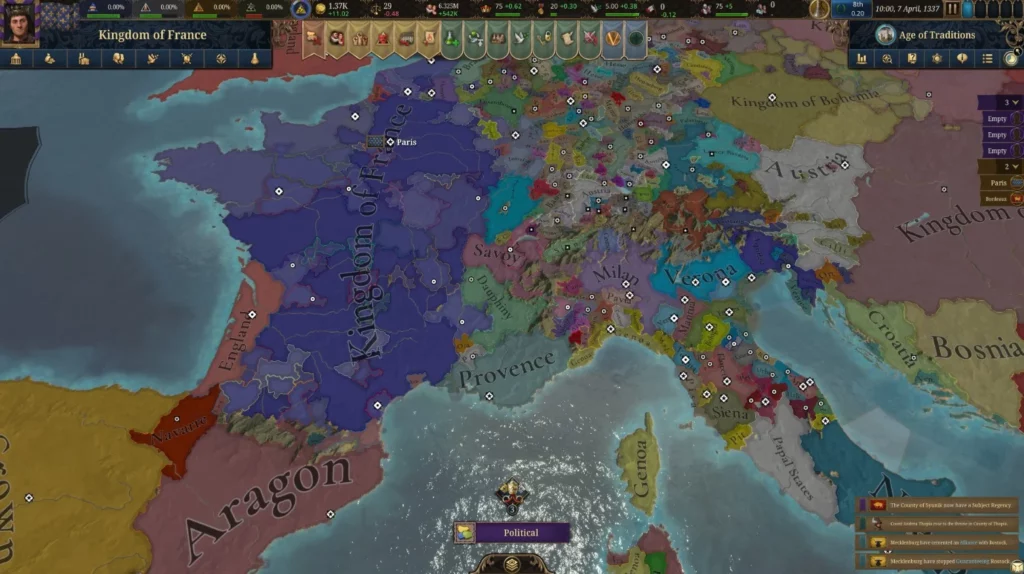Europa Universalis 5: Reforging the Grand Strategy Crown
Few series in gaming embody the term “grand strategy” quite like Europa Universalis. For over two decades, Paradox Interactive has defined and refined the art of simulating history at continental scale. With the release of Europa Universalis 5, the studio’s goal is not just to refine old mechanics but to reinvent them. Turning a map-based empire simulator into an alive, breathing history of human development.
In a way, the newest installment of the long-running series does indeed feel more like a bold experiment than a sequel: a test of how far historical simulation can go before it starts to feel like an engine of a digital civilization. The plans are ambitious, and even if we are in early days, it is obviously ambitious.
A New Age Begins
The Europa Universalis 5 announcement got the strategy game community buzzing! Fans have been guessing about it for ages, checking every forum post and tweet from Paradox, wondering when it would drop. Well, it’s official: Europa Universalis 5 is coming out on November 4, 2025. Mark your calendars!
But this is not simply Europa Universalis 4 with prettier maps. The sequel promises a fundamental shift in philosophy. Paradox’s design team, led by Paradox Tinto, reimagines the game as a holistic world simulation — one that models not only politics and war, but also the individual people whose lives form the foundation of empires. The scope is staggering: the game covers the years 1337 to 1836, spanning late medieval Europe to the dawn of industrial modernity.
Players who are querying “when is Europa Universalis 5 coming out?” will feel the wait is long, but the reason behind this wait is clear. Paradox Interactive is not building just another expansion of previous ideas, but a whole new era of history.
Building the World: From Feudal Realms to Enlightened Nations
The central thesis of Europa Universalis 5 is the transformation of society across time. Players begin in an age defined by feudalism, steppe hordes, and divine right — and end with constitutions, revolutions, and industrialization. The world is not static; it changes, mutates, and resists.
Every region now teems with “pops” — individual people representing workers, nobles, soldiers, and clergy. Each pop has its own culture, religion, class, and political leaning. When famine strikes or the Black Death rolls in, you feel it in population loss, economic contraction, and civil unrest. When prosperity returns, trade routes hum and new technologies emerge.
It’s not just a map — it’s a living biosphere of human ambition and tragedy. This is Paradox at its most daring: creating a self-sustaining historical simulation that can generate organic alternate histories with frightening plausibility.
Paradox Interactive’s Grand Experiment
The Europa Universalis games have always been about how different things work together – like taxes, business, talking to other countries, and fighting. But in Europa Universalis 5, Paradox is adding something different: feelings. Countries aren’t just blocks of stuff anymore; they actually live, fall apart, and change.
Players still manage familiar aspects: estates, monarch power, religious unity, and government reform. Yet each of these now ties directly to the underlying population structure. If your peasants are overtaxed or your burghers deprived of trade privileges, expect strikes, uprisings, or mass migration. A nation’s fate depends as much on managing its citizens as it does on commanding its armies.
Paradox Interactive has also woven AI decision-making deeper into every layer. Diplomats, generals, and merchants act semi-independently, suggesting strategies or warning of risks. This “soft AI” guidance — part tutor, part opponent — makes the experience more approachable while retaining the depth veterans expect.
Steam Integration and Modding Freedom
Unsurprisingly, Europa Universalis 5 Steam will be the definitive platform for most players. As with all Paradox titles, modding support remains a cornerstone of the experience. The Steam Workshop integration promises immediate access to community creations — from historical overhauls to total conversions set on alien worlds.
Early developer diaries hint at powerful scripting tools and improved performance for modders, addressing one of Europa Universalis 4’s lingering weaknesses. If Paradox delivers on that promise, EU5’s longevity could rival Skyrim or Cities: Skylines.
It is this mix of developer aspirations and community abandon that has established Paradox as one of the most venerated developers in PC gaming. If Europa Universalis 5 lives up to what it is promising, it could emerge as the definitive monument to what Steam Workshop creativity can achieve.
When Will Europa Universalis 5 Be Released?
So, if you’re googling about the Europa Universalis 5 release date, there might be an answer already. Paradox likes to update and improve their games over time with expansions and DLCs.
So, while the official Europa Universalis 5 release date estimate anchors the game in late 2025, few doubt that post-launch updates will transform it further. Expect a steady rhythm of content patches, bug fixes, and perhaps a surprise Europa Universalis 5 announcement about early-access features or companion tools.
The truth is, with Paradox’s track record, release is just the beginning of the story.
The Art of Time
Time itself functions as both theme and mechanic. The player spans half a millennium — a dance between the medieval and modern ages. The passage of time reshapes the map as borders dissolve and reemerge.
In Europa Universalis 5, time isn’t just a clock ticking forward; it’s a sculptor, carving civilizations into form. Every decision reverberates across centuries. Raise taxes today, and you might fuel a civil war decades later. Embrace the Reformation, and you might ignite revolutions you cannot control.
Paradox’s simulation engine calculates countless interactions each month: population growth, economic flows, migration, and the balance of power. The world’s dynamism means no two campaigns will unfold alike.
System Requirements and Technical Ambition
The Europa Universalis 5 system requirements reflect the game’s monumental scope. Paradox has stated that the engine is capable of rendering millions of individual agents, and hundreds of them active, at the same time, and it’s optimized for better performance scaling on multicore CPUs and GPUs.
The recommended specifications call for at least a Ryzen 7 or Intel i7 processor, 32GB of RAM, and a modern GPU equivalent to an RTX 3080 or Radeon RX 6800 XT. That’s a hefty requirement — but understandable, given the game needs to simulate half a millennium of “real-time” history.
The developers also emphasize scalability: lower-end machines can disable population detail or run at simplified map layers. Yet it’s clear that Europa Universalis 5 is built for the future — a showcase for PC strategy as both art and engineering.
AI and the Challenge of Complexity
AI remains both the greatest strength and weakness of any Paradox game. In Europa Universalis 5, it governs not only rival nations but also the behavior of your own advisors and estates.
In theory, this dynamic AI system ensures a more reactive world — one where alliances shift, rebellions simmer, and opportunistic wars break out without player prompting. In practice, early impressions suggest the AI sometimes hesitates, preferring peace to opportunism. Rivals may fail to exploit your weakness, leaving the map unusually static.
Paradox says this is on purpose: a smarter AI tries to make realistic stability in the world instead of always trying to take over. It’s not clear if this will make the game better, but it’s definitely a brave move.
Europa Moon and the Future of Paradox
Fans noticed an Easter egg in the teaser trailer: a mysterious image labeled “Europa Moon.” Some speculate it’s a nod to a future Paradox project or a tongue-in-cheek hint at expanding the “Universalis” brand beyond Earth.
While the company hasn’t confirmed anything, it reflects the studio’s confidence. Having dominated historical simulation for years, Paradox Interactive seems ready to explore entirely new frontiers — both literal and conceptual.
For now, though, the focus remains squarely on Europa Universalis 5 Paradox, which already represents the studio’s most ambitious fusion of storytelling, systems, and simulation to date.
The Human Element
Perhaps the greatest triumph of Europa Universalis 5 lies in how it personalizes history. You no longer view events as abstract numbers but as consequences for living populations. Each province houses thousands of individuals whose faith, wealth, and suffering shape your empire’s destiny.
When plague or war strikes, you see the devastation ripple through production, trade, and morale. When peace returns, the rebirth feels tangible. This shift toward population-driven systems brings the Universalis series closer than ever to true societal simulation.
The result is a paradox — pun intended — of control and chaos. You are both omnipotent ruler and helpless observer, watching centuries unfold as if through the lens of time itself.
Civil War and Chaos
No historical simulation would be complete without the specter of civil war. In Europa Universalis 5, domestic conflict arises organically. A divided nobility, starving peasants, or rival religions can tear a nation apart.
Unlike earlier games, these wars are not scripted events but emergent phenomena. They erupt from the simmering tensions in your population model. You might face rebellions rooted in cultural oppression, fiscal mismanagement, or ideological extremism.
Managing such crises becomes a minefield: if you reform too slowly, you will have a revolution; if you reform too quickly, the entrenched powers will fight back. In that sense, Europa Universalis 5 embodies the essence of cyclical history – how every empire cultivates the seeds of its end.
Paradox’s Design Philosophy
Paradox Interactive really cares about being complex, open, and giving players choices. They keep tweaking their games so you can play around with history and change it. They talk to fans a lot and work with them on Steam Workshop. Not many studios do that, and Europa Universalis 5 will probably do the same.
The devs have said they might add more to areas outside Europe after the game comes out. They also want to fix the AI and add cross-platform multiplayer on Steam. This shows Paradox is thinking long-term, like it’s not just making a game only, but something that grows.
The Long March Through Time
The immense depth of Europa Universalis 5 is overwhelming. The simulation of 500 years of history requires balancing seemingly endless subsystems — trade, politics, warfare, religion, and technology. Each decision seems like a butterfly wingbeat that is capable of changing the world centuries later.
However, for all its complexity, the game is deeply human. It encourages reflection on the passage of time, civilization’s fragility, and cyclical rise-and-fall. Your empire grows older: rulers die, dynasties collapse, ideologies wane. The simulation becomes a contemplation on impermanence itself.
In that way, Europa Universalis 5 has ascended from being a game into its own philosophical artifact: an interactive history of our collective present and imagined futures.
Europa Universalis 5 Ne Zaman Çıkacak?
For global fans, curiosity crosses languages. Turkish players ask, “Europa Universalis 5 ne zaman çıkacak?” — when will it launch? The answer, again, is November 4, 2025. But beyond that, the question reflects universal anticipation.
From Istanbul to Stockholm, Tokyo to São Paulo, strategy enthusiasts await their chance to reshape history once more. Few titles unite such a diverse international audience under one banner of curiosity and obsession.
The Grand Narrative
Every campaign in Europa Universalis 5 becomes a complete tale of successes and failures. You might unite Japan under a shogunate, or bring back Byzantium, or turn Mali into a regional powerhouse. Every pixel of the map is a setting for human drama, with ambition, faith, and greed taking eternal turns.
What distinguishes EU5 is how it frames those stories within broader cultural and demographic tides. You no longer merely paint the map; you nurture — or neglect — the people who live on it.
Final Thoughts: The Universalis Legacy
While we await the full release of Europa Universalis 5, one thing is clear: Paradox is investing heavily in its legacy. The game is a testament to both continuity and change – paying homage to the careful design philosophy of the previous games while still daring to move on.
For players old and new, the question isn’t merely “when will Europa Universalis 5 be released” but what kind of game will it become? Will it redefine the genre once again, or collapse under its own ambition?
If history is any guide, Paradox Interactive thrives on iteration. Each release refines the art of grand strategy a little further. And so, as the countdown continues — when is Europa Universalis 5 coming out? When does Europa Universalis 5 come out? — the answer feels almost symbolic: it comes out when history itself is ready to be reborn in digital form.
Until then, strategists around the world can only wait — and dream of the moment when time, universalis, and Paradox converge once more.



